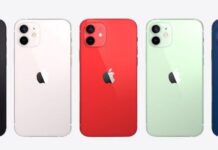When new iPhones come out a lot of people start asking the same questions every year: is it better to buy the standard version of the new generation series or the Pro/Max version of the old generation iPhones. Every year the answer to this question can naturally be different because Apple phones always come with different specifications. That is why people keep asking. This year, is it better to choose the iPhone 12 or the iPhone 11 Pro? Well, the answer actually depends on the user needs: through this comparison, we hope to let you find out which phone is the most suitable for you between these two handsets.

Apple iPhone 12 vs Apple iPhone 11 Pro
| Apple iPhone 12 | Apple iPhone 11 Pro | |
|---|---|---|
| DIMENSIONS AND WEIGHT | 146.7 x 71.5 x 7.4 mm, 164 g |
144 x 71.4 x 8.1 mm, 188 g |
| DISPLAY | 6.1 inches, 1170 x 2532 pixels (Full HD+), Super Retina XDR OLED | 5.8 inches, 1125 x 2436p (Full HD+), Super Retina XDR OLED |
| PROCESSOR | Apple A14 Bionic hexa-core 3.1 GHz | Apple A13 Bionic hexa-core 2.65 GHz |
| MEMORY | 4 GB RAM, 64 GB – 4 GB RAM, 128 GB – 4 GB RAM, 256 GB | 4 GB RAM, 64 GB – 4 GB RAM, 256 GB – 4 GB RAM, 512 GB |
| SOFTWARE | iOS 14 | iOS 14 |
| CONNECTIVITY | Wi-Fi 802.11 a/b/g/n/ac/ax, Bluetooth 5, GPS | Wi-Fi 802.11 a/b/g/n/ac/ax, Bluetooth 5, GPS |
| CAMERA | Dual 12 + 12 MP, f/1.6 + f/2.4 Dual 12 MP + SL 3D f/2.2 |
Triple 12 + 12 + 12 MP, f/1.8 + f/2.0 + f/2.4 |
| BATTERY | 2815 mAh, fast charging 20W and Qi fast wireless charging 15W | 3046 mAh, Fast Charging 18W, Qi wireless charging |
| ADDITIONAL FEATURES | 5G, optional dual SIM, optional eSIM, MagSafe, IP68 waterproof | IP68 waterproof, optional dual SIM, optional eSIM |
Design
Both iPhone 12 and iPhone 11 Pro have a premium design, but in my honest opinion, the iPhone 11 Pro is more premium. Well, the iPhone 12 has Ceramic Shield, but according to the first tests, it is not as amazing as Apple described it. On the other hand, the iPhone 11 Pro sports a stainless steel frame instead of the aluminum frame found on the iPhone 12. It does not have flat borders, but it is sturdier. But you should note that iPhone 12 is waterproof up to 6 meters deep, while iPhone 11 Pro reaches a max of 4 meters. The iPhone 12 has the MagSafe connector for better wireless charging and other features, while iPhone 11 Pro does not. Last but not least, the iPhone 11 Pro is more compact and easier to use with one hand. My choice would be iPhone 11 Pro: what would you go for?
Display
The iPhone 12 and the iPhone 11 Pro have very similar displays, despite not identical. Both feature a resolution superior to Full HD+, the Super Retina XDR OLED technology, the HDR10 certification, Dolby Vision, wide color gamut, and True Tone. The iPhone 11 Pro has higher typical brightness, while the iPhone 12 offers a wider panel. Whatever you choose, you will get an amazing display with very few rivals in the whole market, so do not focus so much on this. Both the devices do not offer a fingerprint scanner but they rely on Face ID for authentication. iPhone 12 and 11 Pro sport stereo speakers for a great audio experience, but they have no audio jack like all the phones starting from the 7.
Specs & Software
Hardware and performance are the main advantages of the Apple iPhone 12 over the iPhone 11 Pro. It has a stronger chipset: the Apple A14 Bionic, and it even supports 5G connectivity, unlike its rivals. With the iPhone 11 Pro, you can get more internal storage (up to 512 GB of native storage), but that is the only advantage. The iPhone 12 is faster and it has better connectivity. Last but not least, it runs iOS 14 out of the box, while iPhone 11 Pro is based on iOS 13. So there are no doubts, the iPhone 12 wins the hardware and software comparisons.
Camera
The iPhone 11 Pro is a more interesting phone for photography for a single reason: it offers a third additional telephoto sensor with a 2x optical zoom. The iPhone 12 has just two sensors on the rear side: the main sensor and the ultrawide lens; it lacks a telephoto sensor. Inside the notch, you get the same sensor with both the devices: a 12 MP selfie camera and an SL 3D sensor for depth calculation and 3D facial recognition. In two words, the iPhone 11 Pro has better zoom capabilities and it provides 2x lossless zoom thanks to a dedicated sensor, while iPhone 12 does not. On the other hand, the iPhone 12 has a brighter focal aperture which should capture a higher amount of light for great shots in low light conditions, but the additional telephoto lens is definitely more important.
- Read More: iPhone 12 is expected to beat Galaxy S20+ 5G as the best-selling 5G smartphone in H2 2020
Battery
Despite the iPhone 12 is bigger and it has a bigger display, it comes with a smaller battery than the iPhone 12 Pro. This does not necessarily mean that the iPhone 12 will have shorter battery life in every scenario because it has a more efficient chipset built at 5 nm, but the iPhone 11 Pro lasts more with most of the usage patterns thanks to its bigger battery, lack of 5G support and smaller display. iPhone 12 has faster wireless charging and MagSafe support: you do not get it with the 11 Pro. Even wired charging is faster on the iPhone 12. There are just 2 Watts of difference in fast charging, but the iPhone 12 has a smaller battery than 11 Pro, that is why charging is even faster.
Price
The base variant of the iPhone 12 with 64 GB of internal storage has a listing price of €839/$799. Thanks to street prices, you can find the 11 Pro for less than €900/$900 even in the configuration with 256 GB of native storage. Overall, the iPhone 12 is a more interesting phone than the iPhone 11 Pro. The only advantages of its predecessor are the presence of an additional telephoto sensor, the stainless steel frame, and a slightly bigger battery. But the iPhone 12 has a better chipset, MagSafe, native iOS 14, 5G, and more interesting features. I would personally go for the iPhone 12 since its battery life is still good and the telephoto sensor does not make the difference. Which one would you pick?
PRO and CONS
Apple iPhone 12
PRO
- MagSafe
- Better hardware
- Wider display
- 5G
CONS
- Inferior cameras
Apple iPhone 11 Pro
PRO
- More compact
- More cameras
- Bigger battery
- Better street prices
CONS
- No 5G







